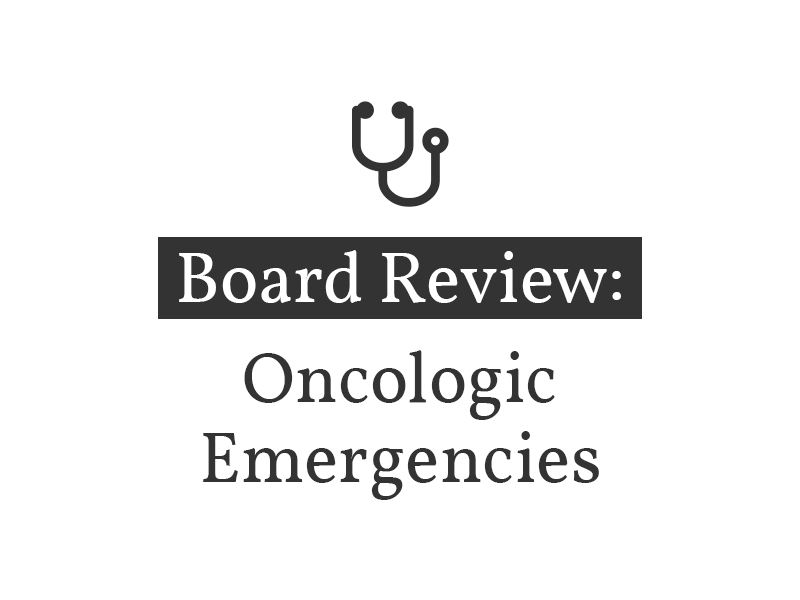SimWars
This post is part of a series developed in preparation for participation in ACEP SimWars. It contains a review of several prominent emergency medicine topics which may be relevant for board preparation. Unless otherwise cited, content is based on HippoEM videos.
- Toxicology
- Dermatologic Emergencies
- Acid-Base Disturbances
- Thyroid Emergencies
- Adrenal/Pituitary Emergencies
- Oncologic Emergencies
- Bleeding Disorders
- Hematologic Emergencies
- Submersion Injury
- Radiation Exposure
- Hypothermia
- Heat Emergencies
- Electrical Injuries
- Bites
- Altitude and Dysbarism
- Pediatric Emergencies
Overview
- Complications
- Airway obstruction
- PNA
- Pleural effusion
- Pericardial effusion
- VTE
- SVC syndrome
- Symptoms: dyspnea (airway edema), chest fullness, blurred vision, headache (increased ICP)
- Massive hemoptysis
- Management: ETT (large-bore for bronschoscopy), affected side down
- Brain Metastases
- Cancers: melanoma, lung, breast, colorectal
- Management: dexamethasone 10mg IV load, elevated HOB, hypertonic saline or mannitol, prophylactic anti-eplipetics
- Meningitis
- Pathogens: Listeria (ampicillin), Cryptococcus (amphotericin)
- Evaluation: CSF sampling with cytology (diagnose leptomeningeal metastases)
Metabolic Disturbances
- Hypercalcemia
- Cancers: MM, RCC, lymphoma, bone metastases (breast, lung, prostate)
- Mechanism: metastatic destruction, PTH-RP, tumor calcitriol
- Prognosis: 50% 30-day mortality
- Symptoms
- Chronic: anorexia, nausea/vomiting, constipation, fatigue, memory loss
- Acute: CNS (lethargy, somnolence)
- Findings
- Calcium: >13.0mg/dL
- ECG: QT shortening
- Treatment
- Mild: IVF
- Severe: IVF, loop diuretics, bisophosphanate (pamidronate 90mg IV infused over 4 hours), consider calcitriol, consider hemodialysis if cannot tolerate fluids or unlikely to respond to diuretics
- Hyponatremia
- Cancers: lung (small-cell), pancreatic, ovarian, lymphoma, thymoma, CNS
- Mechanism: SIADH
- Symptoms: muscle twitching, seizure, coma
- Management: fluid restriction, if seizing administer 3% hypertonic saline at 100cc/hr until resolution
- Hypernatremia
- Mechanism: decreased intake, increased GI losses from chemotherapy
- Management: cautious fluid resuscitation
- Tumor Lysis Syndrome (TLS)
- Cancers: hematologic, rapid-growth solid tumors
- Mechanism: release of intracellular contents (uric acid, K, PO4, Ca)
- Timing: 1-4 days after therapy (chemo, radiation)
- Diagnosis
- Uric acid >8mg/dL
- Potassium >6mEq/L
- Calcium <7mg/dL
- PO4 >4.5mg/dL
- Acute kidney injury
- Management
- IVF, allopurinol, rasburicase, urinary alkalinization
- Consider hemodialysis if volume overloaded
Localized Complications
- Musculoskeletal Complications
- Spinal cord compression
- Cancers: prostate, breast, lung, RCC, non-Hodgkin lymphoma, MM (5-10% of all cancer patients)
- Sites: thoracic (60%), lumbosacral (30%), cervical (10%)
- Symptoms: pain (worse lying flat, cough/sneeze, heavy lifting)
- Evaluation: MRI (se 93%, sp 97%)
- Management: dexamethasone 10mg IV load, 4mg q6h, neurosurgical consultation, radiation oncology consultation
- Pathologic fracture
- Features: sudden onset, low-force mechanism
- Spinal cord compression
- Therapy Complications
- Neutropenic fever
- Definition: ANC <500 or ANC <1000 with expected nadir <500 (nadir typically occurs 5-10d after chemotherapy) with Tmax >38.3°C or >38.0°C for >1h
- Examination: subtle signs of infection, thorough examination is critical (skin, catheter, perineum)
- Treatment: carbapenem monotherapy, vancomycin if indwelling catheter, oncology consultation for colony stimulating factors
- Chemotherapy-induced vomiting
- Management: ondansetron with dexamethasone, consider NK-1 antagonist (aprepitant)
- Neutropenic fever
Hematologic Malignancies
- Acute leukemia
- Signs/Symptoms: leukopenia (infection), anemia (weakness/fatigue), thrombocytopenia (bleeding)
- Diagnosis: >5% blasts
- Thrombocytopenia
- Management
- No bleeding, goal >10,000
- Fever, coagulopathy, hyperleukoctosis, goal >20,000
- One unit of platelets increases count by 5,000
- Management
- Hyperleukocytosis
- Definition: WBC > 50-100k
- Complications: microvascular congestion (pulmonary, cerebral, coronary)
- Symptoms
- CNS: confusion, somnolence, coma
- Pulmonary: dyspnea, respiratory alkalosis
- Management: cytoreduction (induction chemotherapy, increased risk TLS)
- Hyperviscosity
- Cancer: macroglobulinemia, MM
- Symptoms: epistaxis, purpura, GIB, neuro deficits
- Diagnosis: serum viscosity > 1.4-1.8
- Management: emergent plasmapheresis
- Polycythemia
- Diagnosis: Hb >17
- Differential: dehydration, hypoxia, smoking, altitude
- Symptoms: HA, vertigo, angina, claudication, pruritus (after showering)
- Complications: thrombosis (stroke), bleeding
- Management: emergent phlebotomy (500cc if otherwise healthy)
- Thrombocytosis
- Diagnosis: platelet >1,000,000
- Symptoms: vasomotor (HA, lightheadedness, syncope, chest pain, paresthesias)
- Management: low-dose aspirin

